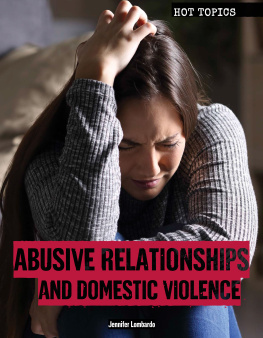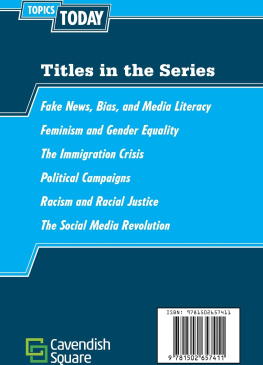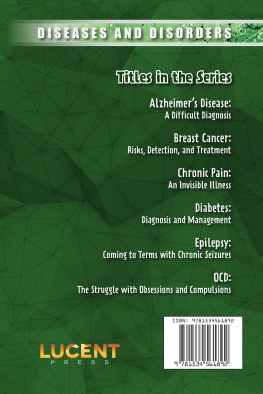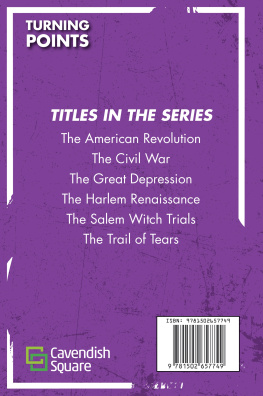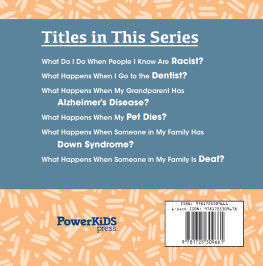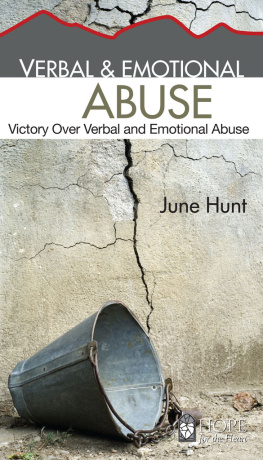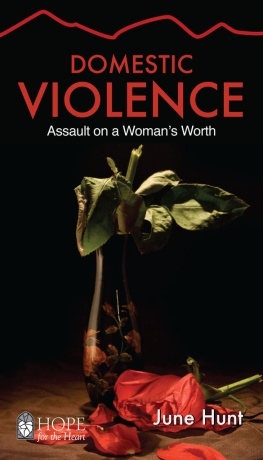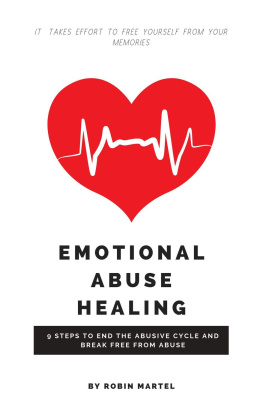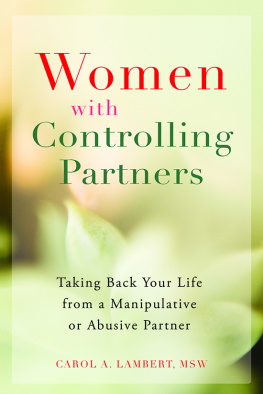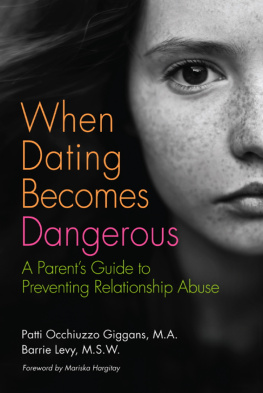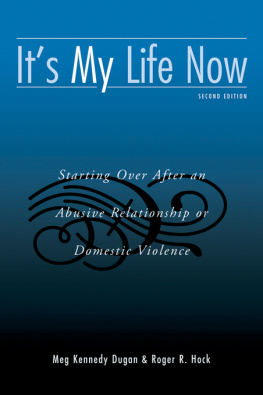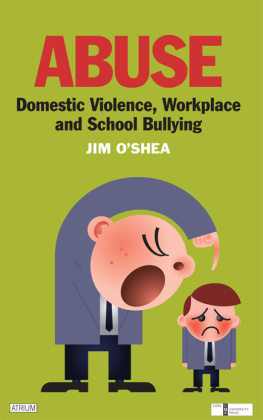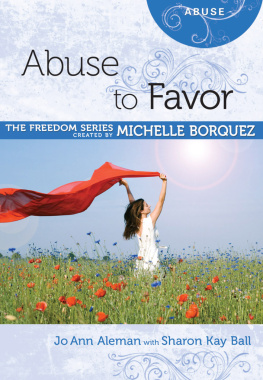- INTRODUCTION
Understanding Abuse - CHAPTER 1
Physical Abuse - CHAPTER 2
Emotional Abuse - CHAPTER 3
Unhealthy Behaviors and Red Flags - CHAPTER 4
Dealing with Abuse - CHAPTER 5
Recovering from Abuse
Published in 2019 by
Lucent Press, an Imprint of Greenhaven Publishing, LLC 353 3rd Avenue Suite 255
New York, NY 10010
Copyright 2019 Lucent Press, an Imprint of Greenhaven Publishing, LLC.
All rights reserved. No part of this book may be reproduced in any form without permission in writing from the publisher, except by a reviewer.
Designer: Deanna Paternostro Editor: Jennifer Lombardo
Library of Congress Cataloging-in-Publication Data
Names: Lombardo, Jennifer, author.
Title: Abusive relationships and domestic violence / Jennifer Lombardo.
Description: First Edition. | New York : Lucent Press, [2019] | Series: Hot topics | Includes bibliographical references and index.
Identifiers: LCCN 2018030681 (print) | LCCN 2018031957 (ebook) | ISBN 9781534565135 (eBook) | ISBN 9781534565128 (library bound book) | ISBN 9781534565111 (pbk. book)
Subjects: LCSH: Offenses against the person. | Interpersonal relations--Psychological aspects. | Family violence.
Classification: LCC HV6493 (ebook) | LCC HV6493 .L66 2019 (print) | DDC 362.82/92--dc23
LC record available at https://lccn.loc.gov/2018030681 Printed in the United States of America
CPSIA compliance information: Batch #BW19KL: For further information contact Greenhaven Publishing LLC, New York, New York at 1-844-317-7404.
Please visit our website, www.greenhavenpublishing.com . For a free color catalog of all our high-quality books, call toll free 1-844-317-7404 or fax 1-844-317-7405.
INTRODUCTION
Understanding Abuse
CHAPTER 1
Physical Abuse
CHAPTER 2
Emotional Abuse
CHAPTER 3
Unhealthy Behaviors and Red Flags
CHAPTER 4
Dealing with Abuse
CHAPTER 5
Recovering from Abuse
FOREWORD
A dolescence is a time when many people begin to take notice of the world around them. News channels, blogs, and talk radio shows are constantly promoting one view or another; very few are unbiased. Young people also hear conflicting information from parents, friends, teachers, and acquaintances. Often, they will hear only one side of an issue or be given flawed information. People who are trying to support a particular viewpoint may cite inaccurate facts and statistics on their blogs, and news programs present many conflicting views of important issues in our society. In a world where it seems everyone has a platform to share their thoughts, it can be difficult to find unbiased, accurate information about important issues.
It is not only facts that are important. In blog posts, in comments on online videos, and on talk shows, people will share opinions that are not necessarily true or false, but can still have a strong impact. For example, many young people struggle with their body image. Seeing or hearing negative comments about particular body types online can have a huge effect on the way someone views himself or herself and may lead to depression and anxiety. Although it is important not to keep information hidden from young people under the guise of protecting them, it is equally important to offer encouragement on issues that affect their mental health.
The titles in the Hot Topics series provide readers with different viewpoints on important issues in todays society. Many of these issues, such as domestic abuse and free speech rights online, are of immediate concern to young people. This series aims to give readers factual context on these crucial topics in a way that lets them form their own opinions. The facts presented throughout also serve to empower readers to help themselves or support people they know who are struggling with many of the challenges adolescents face today. Although negative viewpoints are not ignored or downplayed, this series allows young people to see that the challenges they face are not insurmountable. Abusive relationships can be ended, the internet can be navigated safely, and the environment can be saved.
Quotes encompassing all viewpoints are presented and cited so readers can trace them back to their original source, verifying for themselves whether the information comes from a reputable place. Additional books and websites are listed, giving readers a starting point from which to continue their own research. Chapter questions encourage discussion, allowing young people to hear and understand their classmates points of view as they further solidify their own. Full-color photographs and enlightening charts provide a deeper understanding of the topics at hand. All of these features augment the informative text, helping young people understand the world they live in and formulate their own opinions concerning the best way they can improve it.
INTRODUCTION
Understanding Abuse
D omestic violence, or physical abuse, seems straightforward on the surface: If one partner in a romantic relationship physically hurts anotherfor instance, by punching or slapping themthat is abuse. Few people would argue with this definition. However, things start to get more complicated when abuse is explored more deeply.
When confronted with the realities of abuse by someone they know personallyfor example, if someone is friends with a couple and one of them says the other is being abusivesome people will deny it could be possible or will make excuses for the behavior. An abused person may hear things such as, It was just one time, I know him; he wouldnt do that, or Did you do something to make him mad? Because abuse is considered such a terrible act in most societies, some people have difficulty coming to terms with the fact that someone they know and like is not as nice as they might have thought. Added to this is the fact that abusers often seem charming, generous, and nice in public, creating a huge disconnect between the way most people see them and the way their partner describes how they act in private.
For example, in 2016, actor Johnny Depp was accused of domestic violence by his ex-wife, Amber Heard. She had evidence, including photographs of her injuries, to back up her claim, and Depps former managers filed documents in court stating that they had witnessed the abuse. However, even with all this evidence, many people believed Heard was lying to get money from Depp because they were unwilling to believe that an actor they loved in moviefranchises such asPirates of the Caribbeanand Fantastic Beastscould do somethingso horrible.

Johnny Depp has faced allegations of abusing his ex-wife Amber Heard, and she took photos to back up her accusations. However, many of his fans and people who have worked with him were unwilling to believe it could be true. As a result, Depps career has not suffered.
Even when an abuser is not a personal friend or a beloved celebrity, emotional abuse is often not treated seriously. Many people deny that it exists or that it is a serious problem, and it is often subtle enough that even the person being abused questions if it is actually abuse. As abuse expert Lundy Bancroft pointed out,

